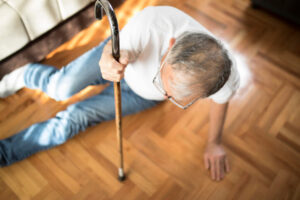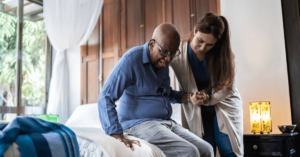Are Falls in Nursing Homes Common?
Yes, falls in nursing homes are extremely common. They are also dangerous and can even be deadly.
Nursing home falls are common because residents are typically older, frail, and dealing with chronic health issues that increase their risk of falling compared to those living independently.


Residents may have memory problems, difficulty conducting daily activities, and trouble taking care of themselves and getting around.
However, even with this increased risk, most falls are preventable, and in these instances, falls in nursing homes could be a sign of neglect.
The Nursing Home Abuse Center partners with a network of experienced nursing home abuse attorneys. Our legal partners have secured over $280 million for incidents of abuse and neglect in facilities across the country, including resident falls in nursing homes.
Get a free case review right now if nursing home falls caused harm to you or a loved one. You could be eligible for compensation.
Falls in Nursing Homes Statistics
Falls in nursing homes often lead to serious injuries, yet only around 57% of nursing home falls are ever reported, according to a study published by the National Institutes of Health (NIH).
This lack of transparency makes it challenging to capture accurate statistics, but the data we do have highlights just how frequent and dangerous falls in nursing homes can be.
Here are some important statistics on falls in nursing homes:
- Falls cause roughly 1,800 deaths per year among nursing home residents
- About 50% to 75% of nursing home residents fall annually
- Nursing home fall rates average 1.7 falls per bed per year
- Roughly 1 in 3 nursing home residents who fall will fall again within a year
- About 1 in 10 falls in nursing homes result in serious injury
- 72% of nursing home falls with injury involve walkers or wheelchairs
- Muscle weakness and gait problems cause about 24% of nursing home falls
- 81% of falls with injury occur in a resident’s own room
- Falls often happen when getting out of bed or getting up from a chair
- 50% of residents who experienced falls with injury have a form of dementia
- Falls with injury most often occur during mealtimes and afternoon/evening
- About 35% of fall injuries occur in residents who cannot walk on their own
If you or a loved one has experienced a fall in a nursing home, you may be able to hold the facility accountable for negligence.
Find out if you can take legal action right now.
Can I Sue for a Nursing Home Fall?
Yes, you can sue if a nursing home’s negligence contributed to a fall. Nursing homes are responsible for providing a safe environment.
When they fail to do so — whether through lack of supervision, unsafe conditions, or ignoring safety protocols — it may make them liable for fall-related injuries or death.
Lawsuits for falls in nursing homes allow families to seek compensation for medical costs. This money can also be used to relocate your loved one to a safer facility.
Here are 3 key legal considerations for suing for nursing home falls:
- Negligence: If staff fail to supervise residents or address hazards like cluttered hallways or broken equipment, the facility may be liable for falls.
- Lack of supervision: A fall may indicate negligence if residents weren’t properly monitored or assisted when needed.
- Failure to follow safety protocols: Procedures for fall prevention in nursing homes must include proper staffing, supervision, and safety measures.
Failure to meet these standards can result in preventable falls and serious injuries like broken bones, head trauma, or death.
If negligence played a role, you may be able to seek compensation for medical expenses or other costs.
Nursing home lawsuits also hold facilities accountable and push them to improve safety for others.
Lawsuits for Falls in Nursing Homes
Nursing home falls can cause irreversible damage to a resident’s health, well-being, and overall quality of life. Families put their trust in nursing homes to protect their loved ones from harm.
Filing a nursing home lawsuit may be the only way to get justice when facilities fail to keep residents safe. A successful lawsuit can result in the money you need to help your loved one recover.
For example, in 2024, a jury awarded a California family $20.5 million on behalf of an 84-year-old who died after suffering multiple falls in assisted living.
Compensation from lawsuits for falls in nursing homes can help pay for:
- Costs of relocating
- Everyday living expenses
- Funeral costs
- Medical bills
- Ongoing expenses
- Physical therapy
Additionally, lawsuits for falls in nursing homes often force facilities to make changes so residents are not harmed in the future.
Consulting with an experienced nursing home lawyer can help you determine your legal options and pursue justice for your loved one.
Find out if we can connect you with a top lawyer near you by getting a free case review.
Injuries From Nursing Home Falls
Falls in nursing homes often lead to severe injuries, particularly for frail residents who are at higher risk of harm. These injuries can have long-lasting effects on a resident’s health, mobility, and overall quality of life.
Common injuries from falls in nursing homes include:
- Broken bones: Fragile bones are more prone to fractures, especially in areas like the hips, wrists, and arms.
- Concussions and head trauma: These are especially concerning, as many older adults are on blood thinners, increasing the risk of dangerous bleeding.
- Fractures: Serious fractures often require surgery and lengthy rehabilitation, potentially leading to long-term complications.
- Spinal injuries: Spinal damage can result in chronic pain, limited mobility, or even paralysis.
In some cases, falls can cause permanent disability, making it difficult or impossible for residents to regain their independence. Falls that result in head injuries are particularly dangerous and can be fatal if not properly treated.
If nursing home falls were preventable, families may have legal rights to pursue compensation. Nursing homes have a responsibility to protect their residents.
If you or a loved one was harmed after preventable or repeated nursing home falls, the Nursing Home Abuse Center may be able to help.
Contact us for a free consultation to see if we can assist your family in pursuing justice.
Death After Falls In Nursing Homes
Falls in nursing homes can be fatal, particularly for older residents who are frail or have underlying health conditions.
In these cases, families may be able to file a wrongful death lawsuit against the nursing home.
5% of adults age 65 and older reside in nursing homes, but 20% of deaths from falls occur among nursing home residents.
Wrongful deaths in nursing home settings typically arise from:
- Failure to address known fall risks, like cognitive impairment
- Improper use of assistive devices or equipment
- Inadequate staffing or supervision
- Unsafe conditions like slippery floors or cluttered hallways
If your loved one passed away due to a preventable fall, time is critical. Evidence can be lost, and deadlines for filing claims can be as short as 1 year.
Consulting with an experienced nursing home neglect attorney can help ensure that you take the necessary steps to hold the facility accountable and seek the compensation your family deserves.
Don’t wait to take action if your loved one died after a fall in a nursing home. Our legal partners may be able to help you understand your rights and options.
Call the Nursing Home Abuse Center now at (855) 264-6310 or Click to Live Chat.
What Causes Falls in Nursing Homes?
Falls in nursing homes are often due to the health conditions of frail residents. However, environmental factors can also lead to avoidable nursing home falls.
Learn more about what causes nursing homes to fall below.
Health Issues and Nursing Home Falls
Many nursing home residents have underlying health issues that increase their risk of falling. Understanding these conditions can help prevent dangerous accidents and improve resident safety.
Medical conditions that may cause nursing home falls include:
- Alzheimer’s and other dementias
- Balance disorders and coordination challenges
- Behavioral symptoms, like wandering
- Being underweight or overweight
- Epilepsy or other seizure disorders
- Having an active hip fracture
- Huntington’s disease
- History of falls
- Incontinence that requires frequent, urgent movement
- Lower body weakness
- Medications like antidepressants, tranquilizers, or sedatives
- Using a walker, cane, or crutch
- Wearing corrective lenses
Addressing these health concerns and implementing proper fall prevention strategies can significantly reduce the risk of falls in nursing homes, helping to protect vulnerable residents.
Environmental Factors of Falls in Nursing Homes
In addition to medical issues contributing to nursing home falls, other causes include hazards that could have been avoided.
Hazards that may cause nursing home falls include:
- Beds that are set too high
- Cluttered living spaces
- Hard-to-manage clothing
- Inaccessible personal items
- Ineffective wheelchair brakes
- Missing equipment parts
- Poor lighting
- Uneven floors
- Unstable wheels on furniture
- Wet floors
Nursing home falls may also be caused by difficulty getting from one place to another, like walking from a chair to a bed, poorly fitted shoes, or poor foot care.
Regardless of the reason, falls in nursing homes should be prevented whenever possible. If you or a loved one was harmed, connect with us right now.
How to Prevent Falls in Nursing Homes


Families should expect nursing homes to have effective fall prevention measures in place.
Nursing home staff must be trained to recognize fall risk factors and take the necessary steps to protect residents. This includes knowing the common causes of falls in nursing home residents.
If your loved one is at high risk for falls, it’s essential to ensure that staff members take proactive measures to keep them safe.
You can request these safety measures to help prevent falls in nursing homes:
- Bedside commodes or adult diapers
- Elevated toilet seats
- Floor cushions to absorb shock
- Grab bars
- Low-profile beds
- Mobility aids, like wheelchairs, canes, or walkers
- Monitors, bed alarms, or personal alarms
- Nightlights
Ultimately, the facility is responsible for implementing fall prevention strategies. If they fail to take these precautions and a preventable fall occurs, families may have legal grounds to seek compensation.
Get Legal Help for Falls in Nursing Homes
Compensation from a nursing home lawsuit can provide families with the financial support they need to recover from the physical and emotional trauma caused by preventable falls.
Attorneys at top law firms are skilled at handling all of the legal work, so you won’t have extra stress.
Our experienced legal partners can help families in all 50 states. They have recovered over $280 million for families, including payouts for falls in nursing homes.
Call the Nursing Home Abuse Center at (855) 264-6310 right now or get a free case review to see if we can help your family.
Falls in Nursing Homes FAQs
What should I do if a loved one dies after a fall in a nursing home?
If a loved one dies after a fall in a nursing home, start by getting their medical records and the facility’s report on the fall. Gather any evidence, like details about staffing or safety measures in place at the time. A skilled nursing home attorney can collect this information for you.
You may be able to file a wrongful death claim if the fall was preventable or due to neglect. This can include issues like poor supervision or failure to follow safety protocols. Since there are deadlines to file, it’s important to reach out to a lawyer quickly.
Call the Nursing Home Abuse Center at (855) 264-6310 right now or get a free case review to see if we can help.
How do you prevent falls in nursing home facilities?
Falls in nursing homes are preventable with proper staff training and precautions.
Facilities should implement fall prevention measures like:
- Bedside commodes
- Grab bars
- Mobility aids
- Personal alarms
Regularly checking for environmental hazards, such as clutter or wet floors, also helps minimize risks.
What legal actions can you take when a resident falls in a nursing home?
If a nursing home fall was preventable, families may be able to file a lawsuit for negligence or wrongful death. Lawsuit compensation can help cover medical bills, funeral expenses, and other damages.
An experienced attorney can take action on your behalf and fight for the compensation and justice you deserve.
How can I investigate nursing home falls?
To investigate a nursing home fall, request an incident report and speak with staff to understand what happened. Review any medical records and facility safety protocols.
You may also want to consult with a legal professional to determine if negligence was involved.
If you or a loved one has been injured due to falls in nursing homes, we may be able to help.
Call the Nursing Home Abuse Center right now at (855) 264-6310.
What should I do after an unwitnessed fall in a nursing home?
If your loved one has experienced an unwitnessed fall in a nursing home, get them immediate medical attention, as some injuries may not be visible right away.
Ask the staff how and when the fall was discovered, and document everything by taking photos of the area where the fall occurred and any injuries.
Consult with a lawyer experienced in nursing home negligence to determine if inadequate supervision or hazards played a role.
You may be entitled to take legal action if the facility failed to prevent the fall. An unwitnessed fall may suggest a lack of proper supervision, so it’s crucial to advocate for your loved one’s safety.
What is the standard nursing home falls protocol?
The standard nursing home falls protocol generally includes several key steps to ensure resident safety and prevent future incidents.
Standard protocol for nursing home falls involves:
- Assessing resident’s fall risk
- Implementing safety measures
- Training staff on fall prevention
- Using assistive devices
When a fall occurs, facilities should conduct immediate assessments, document the incident, and adjust care plans to prevent future falls.
Who regulates nursing home falls prevention?
Falls prevention in nursing homes is regulated by both state and federal agencies, primarily through the Centers for Medicare & Medicaid Services (CMS) and state health departments, which monitor compliance with safety standards.
What is the federal regulation on nursing home falls?
Federal regulations, such as those found in 42 CFR Part 483, require nursing homes to provide a safe environment free from hazards and to ensure that residents receive adequate supervision to prevent accidents, including falls.



